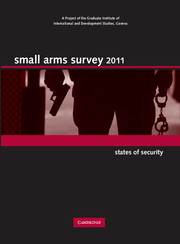Book contents
- Frontmatter
- Foreword
- Contents
- About the Small Arms Survey
- Notes to readers
- Acknowledgements
- Introduction
- Chapter 1 Larger but Less Known: Authorized Light Weapons Transfers
- Chapter 2 Fact or Fiction?: The UN Small Arms Process
- Chapter 3 Procurement and Policy: Police Use of Emerging Weapons Technology
- Chapter 4 A Booming Business: Private Security and Small Arms
- Chapter 5 Protected but Exposed: Multinationals and Private Security
- Chapter 6 Ethos of Exploitation: Insecurity and Predation in Madagascar
- Chapter 7 Reforming the Ranks: Public Security in a Divided Côte d'Ivoire
- Chapter 8 Securing the State: Haiti before and after the Earthquake
- Chapter 9 Balancing Act: Regulation of Civilian Firearm Possession
- Index
Introduction
Published online by Cambridge University Press: 05 March 2012
- Frontmatter
- Foreword
- Contents
- About the Small Arms Survey
- Notes to readers
- Acknowledgements
- Introduction
- Chapter 1 Larger but Less Known: Authorized Light Weapons Transfers
- Chapter 2 Fact or Fiction?: The UN Small Arms Process
- Chapter 3 Procurement and Policy: Police Use of Emerging Weapons Technology
- Chapter 4 A Booming Business: Private Security and Small Arms
- Chapter 5 Protected but Exposed: Multinationals and Private Security
- Chapter 6 Ethos of Exploitation: Insecurity and Predation in Madagascar
- Chapter 7 Reforming the Ranks: Public Security in a Divided Côte d'Ivoire
- Chapter 8 Securing the State: Haiti before and after the Earthquake
- Chapter 9 Balancing Act: Regulation of Civilian Firearm Possession
- Index
Summary
INTRODUCTION
Since the emergence of the modern state, the provision of security to its population has been regarded as one of its core obligations. In its ideal form, the social contract entails a government's agreement to protect the governed. The perceived authority and legitimacy of states thus largely depends on their ability to secure their boundaries and maintain public order.
In practice, however, prospects for a legitimate social contract are far-off for many people around the world. Instead, individuals and communities are compelled to purchase or provide their own security if they are to have any at all. Not only do governments routinely fail in their obligation to guarantee public order but some perpetrate wide-spread violence against their own population. In parts of Africa, Asia, and Latin America, public security providers are almost completely absent from the lives of people living in rural areas.
In this context, it is not surprising that scholars and policy-makers are revisiting certain fundamental questions about security provision in the 21st century: Who actually provides security, and under whose authority? What policies, activities, and technologies ensure that security is provided? Who are the beneficiaries of security provision, and who loses out? These are not esoteric, theoretical questions, but practical, empirical ones. The answers often lie in the multiple, overlapping, and hybrid security-promotion efforts adopted by governments and communities around the world.
- Type
- Chapter
- Information
- Small Arms Survey 2011States of Security, pp. 1 - 8Publisher: Cambridge University PressPrint publication year: 2011



